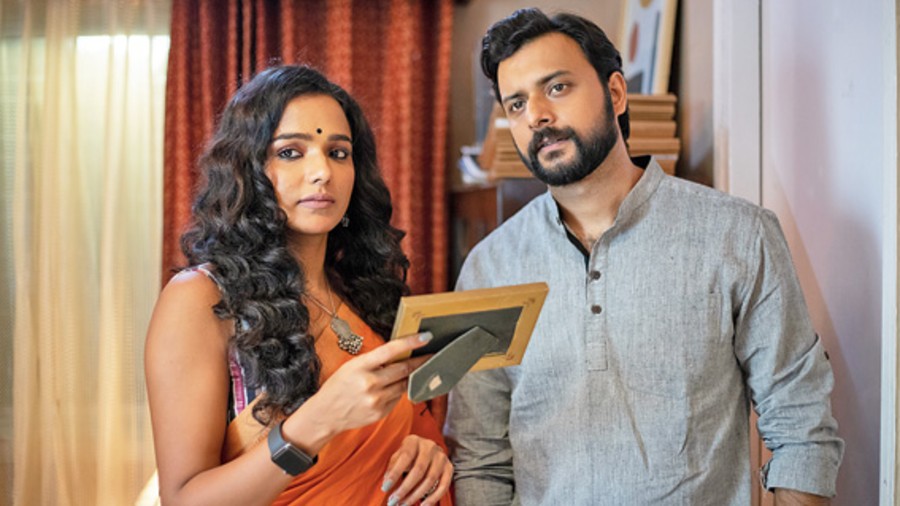Detective Damayanti (played by Tuhina Das) is back! And this time she will not let anything get in her way! In Nokol Heere, streaming on Hoichoi, Damayanti investigates a case where Dipanwita (played by Rajnandini) shoots her husband to death. But her father believes that she cannot be a cold-blooded murderer. Produced by Roadshow Films in association with Emveebee Media, the series is created and directed by Aritra Sen and Rohan Ghose. A chat with Aritra...
Why pick this particular story to make into a series?
Usually we see detective stories pan out as thrillers. It was the case in the first season as well but this time we wanted a story which was complex in its structure. This story was very complex in terms of the crime and the interpretation of it. This is where Damayanti and her sensibilities come in, which sets her apart from other detectives. I thought that could carve a niche out, which people would be intrigued to see.
What are some of the key themes this season?
The main theme of this season is the search for WHY the crime rather than “what”. We are sometimes obsessed with who committed the crime rather than understand the psyche behind it. Here Damayanti digs beneath the apparently transparent crime and uncovers dark secrets which reveal why the crime was committed. This makes Damayanti come of age I feel . Also we address issues which are pertinent to modern family structure where values are degrading and how people have become selfish and self-centred .
Nokol Heere interestingly is a howdunit and whodunit. You reveal the killer in the beginning but gradually drop hints that suggest things are not what they appear to be. Why take this path? What are the advantages of this format?
The path is taken from the nature of investigation that Damayanti leads. To fit this structure in the series format, we have added lot of layers to the story. We have adapted it with a lot of changes to make the motive of the crime well placed and believable. The advantages here are that people are constantly guessing. Also it leads to a lot of introspection and questions which arise through the constant probe of the story.
Damayanti becomes a private investigator in this season. And later Damayanti questions the whole job profile of the PI. What are your thoughts on the nature of the job of the PI?
Sometimes the job profile of a PI can be reduced to a very petty one. Also PI and police do not always go hand in hand. Damayanti is of the opinion that in order to dig deep into the truth one does not need to be officially a PI. She is more concerned with studying the complex nature of a crime and reading the mind of a criminal rather than just clinically solving a crime. This sets her apart from a PI.
How has Tuhina grown into the role of Damayanti? What are her changes from Season 1?
Tuhina has adapted very well. She is now Damayanti. In the first season it was the introduction of Damayanti. She grows into being a detective and gets introduced to true crime. She was more reactive than adjusting and reacting impulsively. But here in the second act she is far more calm and pragmatic. She plans her steps well. She prepares for a final onslaught and she challenges an antagonist who is really strong and complex. Damayanti and Tuhina both have matured in this season .

Rajnandini Sourced by the correspondent
Why cast Rajnandini in a complex role? What are her strengths as an actor?
Rajnandini is a very impulsive actor. She fits into the role effortlessly. It feels as if Dipanwita is an extension of her. The character is very layered. She has her demons to fight with. Rajnandini’s natural portrayal has helped shape up the character really well .
Damayanti also goes by her gut instinct. How important is that for a detective?
It is the most important aspect of a detective. Not everything is black and white in a crime. Here the number of characters involved are a lot. All of them have shades and they have their motives in the story. To analyse all this and end up tackling the real reason for the crime, one needs a lot of intuition. Gut instinct is Damayanti’s real prowess. It helps her break through complex situations. It also lands her in a lot of trouble sometimes but then every detective needs to go through a lot in his or her journey to unravel the truth. The same is for Damayanti. She is full of her gut instinct and this positively helps her more often than not.
She also gets help on the intricacies of criminal law from a neighbour. Why was knowing the law so important here?
The structure of the story is such that a crime is committed at the onset. This is the reason Damayanti needs a lot of help in terms of understanding the intricacies of law. She needs to know the facets of law in order to understand the complex nature of the case and all the evidences present. Knowing the law in and out helps to manoeuvre the police well and get her way around. She also challenges the antagonist who is well conversant in law with her newly acquired knowledge.
How has Damayanti’s relationship between her husband and her friend Shiben grown?
This time we see Damayanti and Samaresh in a domestic set-up. They have settled into their new abode as a couple who have married not long ago. We have tried to keep their chemistry alive even in this series. Samaresh is completely in awe of Damayanti but he also questions her when needed and provides a sort of check. He is the one normalising her impulse and also having her back. They discuss about the different aspects of the case and through the conversation we see a lot of break- through happening. Samaresh is indeed her partner in this case as she uses Samaresh in important junctures to spy on people and bring her news that helps her to crack the case. Shiben is the one who hands Damayanti the case this time. We see Shiben and Damayanti forming a duo who delve deep into the case and try to resolve it. Shiben also gives Damayanti the police help so that she is secured. The three of them have a very effective partnership and they bring their own sets of skills on the table to crack open the truth.

Sujoy Sourced by the correspondent
What are the high points of this season?
The fresh nature of the crime story and how a web of complex minds are explored is an unique plot point. Sujoy Prosad Chatterjee as Ramanuj is the highest point of the series. His performance has been exemplary. His role is that of a very intellectual sociopath who is wheelchair-ridden. The different shades of the character are portrayed very well . He feels at home and such a clinical performance is very important for the season to come alive. The series is very fast paced and intriguing. Sumi Chowdhury has mashed the edit so well that one can float from one track to the other in a seamless way. It was a very difficult series to edit with so many tracks. I think the edit has made the series even more intriguing and effective.
What were your main challenges while shooting this season?
The main challenge was controlling the performances of so many characters. Everyone has motives that are linked to the main track. Hence if any character fell flat then the whole thing would not come alive. But all actors have done a great job.
It’s the first series that we have directed that focuses more on the complex psyche and screenplay rather than the visual aspects. So to control the narrative in a way that the performances drive the series was a first for us. Hope the audience like the unique nature of the script and the interplay of different characters who all form an interesting matrix which Damayanti is out to decode.











